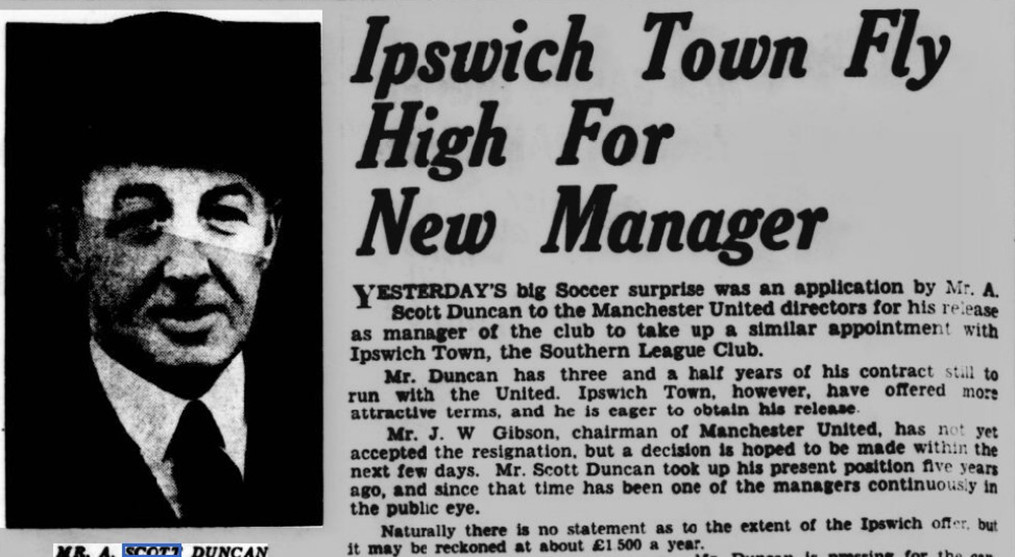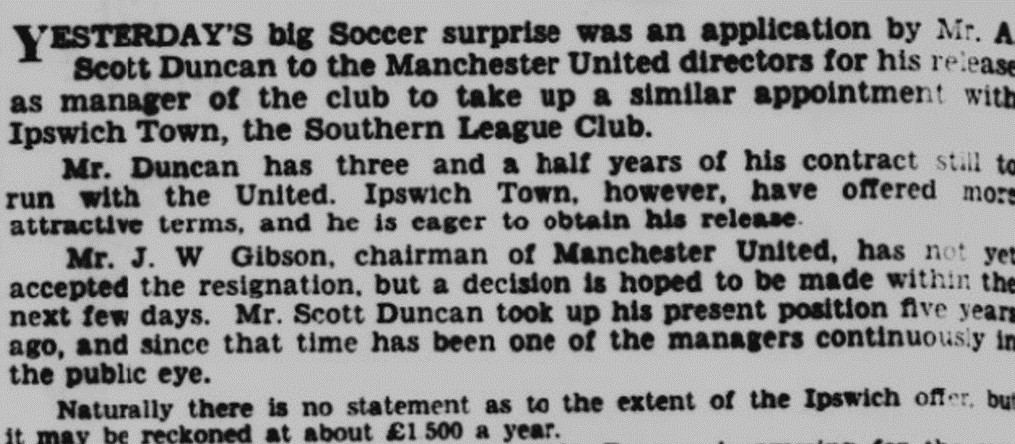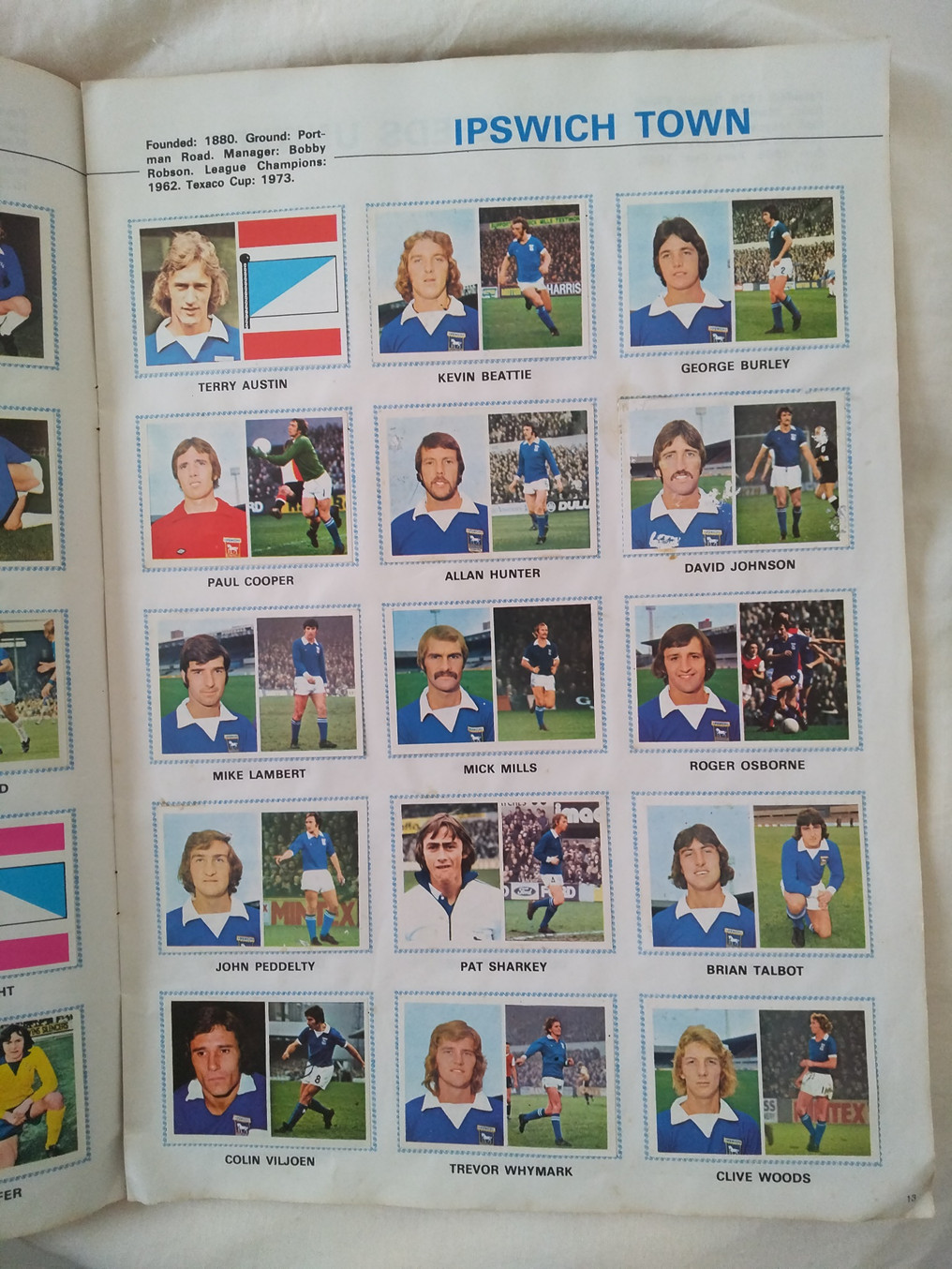| Ten Stand-Out Moments in Ipswich History Written by kushiro on Wednesday, 15th May 2024 10:09 Thanks for the interesting comments on the Charlie Woods Forum thread recently. I didn't mention it at the time as I didn't want the thread to get sidetracked, but now we're both safely promoted, I can say that I usually write historical pieces about Leicester City. It was while interviewing ex-Filbert Street boss Gordon Milne last year that he put me in touch with his old friend Charlie. The time I spent talking to him deepened my interest in his old club, and here I'd like to present an outsider's view of the stand-out moments in Ipswich Town history. You might find the choices a little biased towards the dim and distant past, but please comment and tell me what you think. I'll present it as a Top Ten: It was all going wrong for Alf Ramsey. In his first season as Ipswich boss the club had narrowly missed out on promotion from Division Three South. Then at the start of the following season they lost five of the first six games. Only Plymouth Argyle were below them in the table, and if it carried on like this they wouldn't be celebrating promotion - they'd be seeking re-election. What made it worse was that sitting proudly at the top of the division were Norwich City. Alf didn't panic. He had faith in his players, and things gradually turned around - at both ends of the table. Actually, for Norwich, it all turned sour pretty rapidly. After that fine start, they went an incredible 26 games without a win. By the time that sequence finally ended in early March, Ipswich were third in the table and Alf had Division Two in his sights. Now it was Norwich who were facing re-election. Over Easter three victories, including a double over the Canaries, took Ipswich top with two to play. That's where they ended up, and part one of Alf's miracle had been completed. Miracle title-wins are something Ramsey and Ranieri have in common. 51 years ago, just as Claudio's story was beginning, Alf's was coming to an end. Ranieri made his debut as a professional on November 4th 1973, playing for Roma against Genoa in Serie A. That was a very interesting day in the Italian capital. Arriving on a plane from England were the Ipswich Town squad, there for the second leg of a UEFA Cup tie against Lazio. On that first day in the Eternal City, Ipswich got themselves into a bit of trouble. Trevor Whymark innocently posed for a photo with a group of Roma fans, who presented him with a plaque for scoring four against their bitter rivals in the first leg two weeks earlier. Whoops. That picture was in the paper the next day, and fanned the Lazio flames. The game at the Olympic Stadium has gone down in history. Ipswich lost 4-2, but went through on aggregate, while the behaviour of Lazio players, staff and supporters led to the club being banned from Europe. Claudio Ranieri's career was just beginning, but Alf Ramsey's was drawing to a close. A week later, the Italian national side came to England and won 1-0. Nobody knew it then but that was the last time he would lead the side out at Wembley. If McKenna did move on, to United or any other club, many would give a resigned shrug and say 'He's an ambitious guy. You can't blame him for taking one of the top jobs'. But there was a time long ago when the roles were reversed. In October 1937, Scott Duncan had been Manchester United manager for five years when he was poached by a Southern League club who had only recently turned professional. Ipswich Town offered him a salary that United just couldn't match, and he moved south:
7) When John Wark hooked in that crucial goal in Holland in May 1981 to set the club on their way to UEFA Cup glory, he equalled the all-time record of 14 goals in Europe in one season. The man whose record he matched was Jose Altafini of Milan, who got 14 as they lifted the European Cup in 1963, beating Benfica at Wembley in the final. Curiously, in the four games Milan played against British clubs on the way to that final, Altafini didn't score a single goal - either against Dundee in the semi-finals, or in the first round - against English champions Ipswich Town.
It's a stickers album that reveals a wholly different era in Englsih football. There are over 300 First Division footballers featured, but not a single black player and not a single foreign player. The closest to a 'foreigner' in the whole album is there on the Ipswich page. Colin Viljoen was an England international, but he was born in South Africa. It was a year later, in the run up to the 1978 Cup Final, that Viljoen really felt like an outsider. A week before Wembley, Bobby Robson picked him over Roger Osborne for a League game at Aston Villa. Osborne had been a regular in the Cup run, and the rest of the team were outraged by the decision. They made their feelings clear to Robson by downing tools at Villa Park - resulting in a 6-1 defeat. Robson got the message, Viljoen was left out at Wembley, and Roger had his moment of glory. Gillingham 18, Walsall 11, Ipswich Town 11. Those numbers were conveyed to the Football League, to give 'an indication of the feelings of the lower division'. It didn't look good for Ipswich. But the clubs in Divisions One and Two paid no heed. When the real vote took place, the results were: Ipswich 36, Walsall 34, Gillingham 24. Ipswich were in, Gillingham were out. November 27th 1968 - Torquay manager Frank O'Farrell decides not to join Ipswich after all. He'd had lengthy discussions with John Cobbold, giving him the impression that he'd soon be heading to Portman Road. When that didn't happen, Cobbold was furious. 'I'm absolutely shattered. After our talk yesterday I was sure he would take the job'. Cobbold's feelings can't have been improved a couple of weeks later when O'Farrell decided to quit Torquay after all - to join Leicester. The search for a new man continued - and it was another month before he was unveiled - Mr. Robert William Robson. That's how it might have been had the club had fewer injuries, a little more luck and a squad with a little more depth. Let's have a look at the high points in those four seasons - the moments when it looked like the title would be heading back to Portman Road. a) With eight games to play in 1974/75, this was the table:
The next game was the big one – Everton v Ipswich at Goodison Park. A win there and it would be neck and neck. And what a start there was to the game. Trevor Whymark put Ipswich ahead after just 66 seconds. Everton were relieved to equalize and come away with their lead at the top still intact. Ipswich were still in the race until a 2-1 defeat at Leeds in game number 40. They finished third behind champions Derby, but Robson's team had shown they could be real title contenders. This was the top of Division One with three months of the season to go:
Signing Paul Mariner and switching John Wark to central midfield led to the surge up the table that left Robson's team in a great position. They were still in contention at Easter when Kevin Beattie's famous bonfire incident caused him to miss crucial games, handing the title to Liverpool. Final position: third. On March 14th, the table showed that there were just two teams in the title race:
A sequence of away defeats then handed the advantage to Villa, but Town regained the initiative with a 2-1 win at Villa Park in April. The killer blows were the home defeat to Arsenal, and the loss at Middlesbrough on the final day. Final position: Second. This is how things stood on January 18th - once again, Town were in total control of their destiny:
But the key moment was Butcher's injury a week later, and once again it was Liverpool who benefited. Final position: Second. 1) The Miracle It works both ways. In 1962, Burnley were the ones who looked sure to win the League. On March 3rd, the Clarets beat West Ham 6-0 and were four clear of Ipswich with a game in hand, having scored an amazing 90 goals in 29 games. But then they fell apart. In the last 13 games they scored just 12 more, winning only twice. Ipswich came past them to land the title - less than six years after sitting one off the bottom of Division Three South. I wonder what the odds are on Ipswich next season? Please report offensive, libellous or inappropriate posts by using the links provided.
|
Blogs by kushiroBlogs 298 bloggers |







